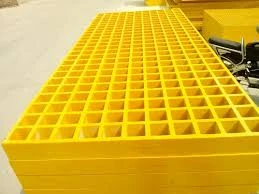loading...
- No. 9, Xingyuan South Street, Dongwaihuan Road, Zaoqiang County, Hengshui, Hebei, China
- admin@zjcomposites.com
- +86 15097380338
- Welcome to visit our website!
Innovative GRP Mesh Flooring Solutions for Enhanced Durability and Safety
Exploring GRP Mesh Flooring A Comprehensive Overview
In the world of industrial flooring solutions, GRP (Glass Reinforced Plastic) mesh flooring has emerged as a versatile and durable option for various applications. Characterized by its lightweight yet robust properties, GRP mesh flooring provides an excellent alternative to traditional flooring materials, especially in environments subject to harsh conditions.
What is GRP Mesh Flooring?
GRP mesh flooring is constructed from fiberglass reinforced plastic, combining the advantages of strength and flexibility. The mesh structure is designed to provide optimal drainage and airflow, making it ideal for wet and slippery environments. The flooring is available in a variety of styles and colors, catering to a wide array of aesthetic and functional requirements.
One of the standout features of GRP mesh flooring is its resistance to corrosion. Unlike conventional metal flooring systems, GRP does not rust or degrade when exposed to chemicals, moisture, or UV radiation. This property makes it highly suitable for applications in industries such as pharmaceuticals, food and beverage, wastewater treatment, and petrochemicals.
Benefits of GRP Mesh Flooring
1. Durability GRP mesh flooring is engineered to withstand heavy loads and impact, making it an ideal choice for high-traffic areas. Its ability to resist wear and tear over time significantly reduces maintenance costs.
2. Safety The anti-slip surface of GRP mesh flooring reduces the risk of slips and falls, particularly in wet conditions. This safety feature is crucial for workplaces where personnel frequently move around potentially hazardous areas.
grp mesh flooring

3. Lightweight Design The lightweight nature of GRP means easier installation compared to traditional flooring systems. It reduces labor costs and time spent on installation, allowing for efficient project completion.
4. Customizable Options GRP mesh flooring can be manufactured in different thicknesses, colors, and sizes according to project specifications. This flexibility allows clients to tailor the flooring to their specific needs.
5. Eco-Friendly As a composite material, GRP is recyclable at the end of its life cycle, making it an environmentally conscious choice for industries looking to minimize their ecological footprint.
Applications of GRP Mesh Flooring
GRP mesh flooring is widely used in various sectors, showcasing its versatility. Some common applications include
- Industrial Facilities Its robust and slip-resistant properties make it a go-to flooring solution for factories and warehouses. - Marine Industries GRP flooring is often utilized on boats and ships due to its water-resistant nature and minimal weight. - Walkways and Platforms In outdoor environments, GRP mesh flooring is used for walkways, catwalks, and platforms in parks or industrial sites due to its drainage capabilities, preventing water accumulation. - Food Processing The flooring’s resistance to harsh cleaning chemicals and its hygienic properties make it suitable for food production areas.
Conclusion
GRP mesh flooring represents a progressive solution for businesses in need of durable, safe, and efficient flooring options. Its unique blend of properties—combining strength, safety, and environmental considerations—makes it a standout choice across various industries. As companies continue to prioritize safety and efficiency, the adoption of GRP mesh flooring is likely to grow, paving the way for innovative applications and designs in the world of flooring solutions. Whether for new projects or renovations, GRP mesh flooring offers a reliable solution that meets the demands of modern industrial environments.
-
Transform Your Spaces with FRP Grating SolutionsNewsNov.04,2024
-
The Versatility and Strength of FRP RodsNewsNov.04,2024
-
The Excellence of Fiberglass Water TanksNewsNov.04,2024
-
The Benefits of FRP Grating for Your ProjectsNewsNov.04,2024
-
Elevate Your Efficiency with FRP Pressure VesselsNewsNov.04,2024
-
Welcome to the World of FRP Pressure VesselsNewsOct.12,2024
-
Unveiling the Future of Filtration: Why FRP Filter Vessels are a Game ChangerNewsOct.12,2024
